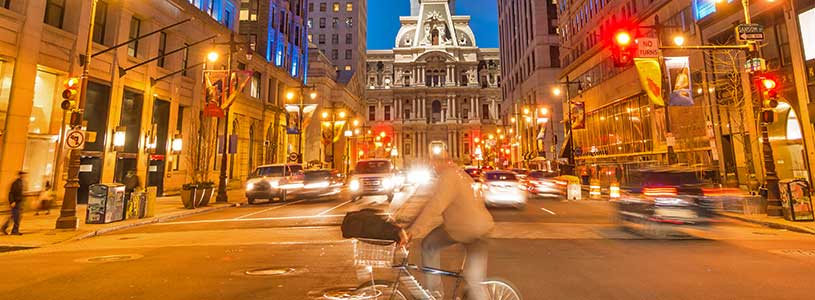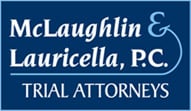Let’s Keep Our Roads Safe for Everyone
“Traffic deaths are preventable and unacceptable.” As trial lawyers we protect communities for a living, so of course we would say that. But that’s not us talking; it’s the City of Philadelphia in its Vision Zero program, which aims to eliminate all traffic-related deaths and severe injuries, while increasing safety, health, and mobility for all.

We have a long way to go to get to zero. There are about 6 million car crashes in the United States every year, and about 3 million people are injured. More than 100 people die in car accidents every day, according to the National Transportation and Highway Safety Administration; and these numbers only include deaths and accidents on public highways; they leave out parking lots, driveways, and private roads, so the real numbers are actually higher. These numbers are indeed both preventable and unacceptable.
Related Articles
- Philadelphia Auto Accident Lawyers – Experience & Reputation Matters
- Have You Been Injured in a Car or Truck Accident in Pennsylvania?
- Insurance and Lawsuits – What You Need To Know!
- Which Cities in Pennsylvania Have The Worst Drivers?
- New Jersey Auto and Truck Accidents
High Rate of Accidents – Philadelphia Traffic Deaths & Injury
Philadelphia, unfortunately, has more than its fair share of traffic deaths and collisions. Every year about 100 people are killed in motor vehicle crashes in Philadelphia – that’s about 6 deaths for every 100,000 residents, a rate that is higher than the rate found in Los Angeles, Boston, or New York City. Unfortunately, this fatality toll falls extra hard on bicyclists and pedestrians: they are involved in about one in every five crashes but make up half of all fatalities.
Lots of people talk about traffic “accidents,” but the simple fact is, there are really very few traffic deaths, car wrecks, and pedestrian collisions that are entirely accidental. In Philadelphia, for example, about half of all driving-related deaths are the result of aggressive driving, according to statistics from the Philadelphia Police Department. But even the other half—the crashes that the police do not attribute to some form of aggressive driving—are not really accidents. They are almost always the result of bad choices that have fatal or catastrophic consequences. Handle enough of these cases (and we have), and you realize that almost every car crash involves inattentive driving, in the sense that, if the driver had been paying full attention, the crash would not have happened.
The same thing is true with trucking accidents, especially tractor trailer accidents. Get under the hood of a trucking company, and all too often you learn that someone made a choice not to properly train their drivers; not to properly screen their drivers; to put dangerous equipment on the highway; or to rush equipment out onto the highway without the kind of proper safety inspections that are required by law. The real cause of these incidents is not just the tired truck driver’s split-second decision to change lanes; it’s management’s decision to put that driver on the road without proper training and proper screening, or management’s decision to put that driver on the road with an impossible set of time pressures that make reckless behavior inevitable.
Cell Phones Are One Cause of Inattentive Driving
Far too often, inattentive driving is associated with cell phone use. We all know about texting while driving. That is never acceptable. Even if a driver is stopped at a traffic light while talking on a cell phone, research tells us that the brain cannot fully focus on driving again for about ten seconds. If the light turns green and the driver steps on the gas, he or she is not immediately capable of paying full attention. That can result in unsafe behavior.
Talking on the phone also makes us less able to pay attention. One important study found that when people drive and talk on the phone, they are impaired as much as a driver with a blood alcohol limit of 0.08 percent (the legal limit for driving under the influence in Pennsylvania). In other words, if you’re talking on the phone while driving, you’re effectively driving as if you are intoxicated. Keep in mind that this effect continues for a brief period even after the driver hangs up the phone.
Using your hands-free phone does not change this dynamic. It’s not the dialing, and it’s not the distraction of awkwardly holding the phone up (although those things certainly don’t help): it’s something about how the brain processes these communications. Interestingly, listening to the radio does not have the same effect, and neither does talking to someone who is in the car with you.
Drivers have a legal right to talk on their phone hands-free while driving. But the twin goals of justice and safety require that those same drivers be held fully accountable for the consequences of that choice.
Another important thing to keep in mind is that our phones carry and preserve a ton of information. Most of the time, our phones know exactly where we are, how fast we are going, what apps we are using, when we pick up and look at our phones, and even how fast we are speeding up or slowing down. Phones can often provide vital information in an auto accident case. An injured party’s right to get this information is not automatic, and it is not essential in every case. But sometimes it is important evidence, and in the right case your lawyer will need to fight to get it. The phone can shine a much-needed spotlight on the truth about exactly why, how, and when an accident occurred.
Pay Attention – Prevention of Philadelphia Traffic Deaths & Injury
Lately, there have been a lot of articles written about how the most precious thing in the world today is not money, but attention. If you doubt this, just ask your family members. We walk around with these smart phones in our hands that are perfectly designed to distract us, and our phones perform that task brilliantly. These same devices and habits of mind come with us when we drive. Paying attention takes work, and does not come automatically. It takes effort and it takes a choice.
A lot of the time, when someone crossing the street is hit by a car, the driver says, “I did not see him,” as if the pedestrian had on some magic invisibility cloak or the like The same thing is true of bicycle accidents. Clever defense lawyers know that this approach can make juries sympathetic to the driver’s plight even if the driver was at fault, because who among us has not missed something that was right there in front of us? But this defense is fundamentally untrue, because we make choices about what we pay attention to. Drivers who fail to notice what is in front of them have made the dangerous choice not to pay attention as they steer more than half a ton of metal through a community. Virtually every case is a distracted driving case.
Getting Back to Work Means Slowing Down
A year ago, safety experts thought that traffic deaths would drop dramatically because COVID restrictions meant people had stopped driving to work. As it turns out, that did not happen; traffic deaths and crashes instead went up – a lot. As of the late Fall of 2020, traffic deaths in Philadelphia were up 60% compared to the previous year. The reason is simple: with fewer people on the roads, we drove faster and paid less attention, at the same time that bicyclists and pedestrians spent more time on streets that suddenly had fewer cars on them. As we make the long-overdue shift back to our normal routines – and as normal driving commutes return – our driving habits will have to change.
The two most important things we need to do are also the simplest: pay attention, and slow down. Do not assume this will be easy; old habits are hard to break. And bear in mind that some other drivers on the road might have picked up some dangerous habits themselves during the past year.
All of us—whether we are on foot, on a bike, or in a car—also need to bear in mind that things are different post pandemic. Many streets in the City of Philadelphia have new traffic patterns, new markings, new pedestrian access, and new bike lanes, changing the configuration of once-familiar intersections and roads. Electric bikes, which are technically bicycles but can move through traffic like a motorcycle, seem to be everywhere. Food delivery couriers on bikes are also everywhere. During the pandemic, many people in Philadelphia took advantage of the suddenly car-free streets and started to bike to work more; many of those people will probably keep up those habits as we reopen.
Safety experts recognize that new traffic conditions raise particular and very real hazards. The fact that we drove a particular route hundreds of times before the pandemic can make a new traffic pattern even more dangerous than it would be if we were driving through the intersection for the first time. That’s because, if we have done something many times before, we are often on autopilot and not paying full attention. A lot of drivers returning to work will encounter once-familiar intersections and roadways that now have new bike lanes, new pedestrian crossing zones, and sometimes even different (and lower) speed limits. These changes can be easy to miss, especially for drivers who are on their phones.
When you are on your bike or on foot, remember that you might be an unexpected surprise for drivers. And if you are driving a car, remember the basic and universal rule mentioned above: pay full attention. The law requires it, and the safety of the community demands it.
Philadelphia Auto Accident Trial Lawyers
Lawyers who actually try these cases — lawyers like the trial lawyers at McLaughlin & Lauricella — know that getting full compensation for an injured person’s harms and losses takes work, even in a case that might on its face seem simple. Getting to full justice takes work. To do that, you need a lawyer who sees the bigger issues, understands how to use technology, knows how to expose the “just an accident” defense as untrue or at least incomplete, and stands ready to put decisions in the hands of a jury. Find a lawyer who comprehends this and stands ready to do the work, and you will have found a lawyer who stands ready to protect your rights.
If you or someone you love has suffered an injury or death in an auto accident, it is important to know that you are not alone. The auto accident attorneys at McLaughlin & Lauricella, P.C., have more than 100 years of experience representing injured accident victims and their families across Philadelphia, Berks, Bucks, Dauphin, Delaware, Lackawanna, Lehigh, Luzerne, Montgomery, and Northampton Counties. We are also proud to serve injured accident victims and families throughout the State of New Jersey. Contact us today toll-free at 1-855-633-6251 or fill out our confidential contact form to learn more about your legal options.



